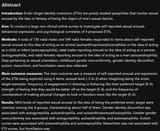Search Results
ID: fWrKm6jH/pol/509373924#509375507
7/3/2025, 8:18:27 AM
>>509373924
Introduction: Erotic target identity inversions (ETIIs) are poorly studied paraphilias that involve sexual arousal by the idea or fantasy of being the object of one's sexual desires.
Aim: To conduct a large non-clinical online survey to investigate self-reported sexual arousal, behavioral expression, and psychological correlates of 4 proposed ETIIs.
Methods: A total of 736 natal males and 549 natal females responded to items about self-reported sexual arousal to the idea of acting as an animal (autoanthropomorphozoophilia) or the idea of acting as a child or infant (autonepiophilia), natal males reporting arousal to the idea of acting as a woman (autogynephilia), and natal females reporting arousal to the idea of acting as a man (autoandrophilia). Data pertaining to sexual orientation, childhood gender nonconformity, gender identity discomfort, autism, masochism, and humiliation were also collected.
Main outcome measures: The main outcome was a measure of self-reported arousal and expression of the ETIIs being explored using 4 items: arousal level (-3 to 3) when imagining being the erotic target exemplar; frequency of engagement in dressing or behaving like their preferred target (0-4); strength of feeling that they would be better off as the target (0-4); and the frequency of consideration of making physical changes to look or function more like the target (0-4).
Results: Mild levels of reported sexual arousal to the idea of being the preferred erotic target were common among the 4 groups, characterizing about half of them. Gender identity discomfort was associated with autogynephilia, autoandrophilia, and autoanthropomorphozoophilia. Greater gender nonconformity was associated with autogynephilia, autoandrophilia, and autonepiophilia. Autism scores were associated with autoandrophilia and autonepiophilia. Masochism was not associated with ETII scores, but humiliation was.
https://pubmed.ncbi.nlm.nih.gov/31813772/
Introduction: Erotic target identity inversions (ETIIs) are poorly studied paraphilias that involve sexual arousal by the idea or fantasy of being the object of one's sexual desires.
Aim: To conduct a large non-clinical online survey to investigate self-reported sexual arousal, behavioral expression, and psychological correlates of 4 proposed ETIIs.
Methods: A total of 736 natal males and 549 natal females responded to items about self-reported sexual arousal to the idea of acting as an animal (autoanthropomorphozoophilia) or the idea of acting as a child or infant (autonepiophilia), natal males reporting arousal to the idea of acting as a woman (autogynephilia), and natal females reporting arousal to the idea of acting as a man (autoandrophilia). Data pertaining to sexual orientation, childhood gender nonconformity, gender identity discomfort, autism, masochism, and humiliation were also collected.
Main outcome measures: The main outcome was a measure of self-reported arousal and expression of the ETIIs being explored using 4 items: arousal level (-3 to 3) when imagining being the erotic target exemplar; frequency of engagement in dressing or behaving like their preferred target (0-4); strength of feeling that they would be better off as the target (0-4); and the frequency of consideration of making physical changes to look or function more like the target (0-4).
Results: Mild levels of reported sexual arousal to the idea of being the preferred erotic target were common among the 4 groups, characterizing about half of them. Gender identity discomfort was associated with autogynephilia, autoandrophilia, and autoanthropomorphozoophilia. Greater gender nonconformity was associated with autogynephilia, autoandrophilia, and autonepiophilia. Autism scores were associated with autoandrophilia and autonepiophilia. Masochism was not associated with ETII scores, but humiliation was.
https://pubmed.ncbi.nlm.nih.gov/31813772/
Page 1
